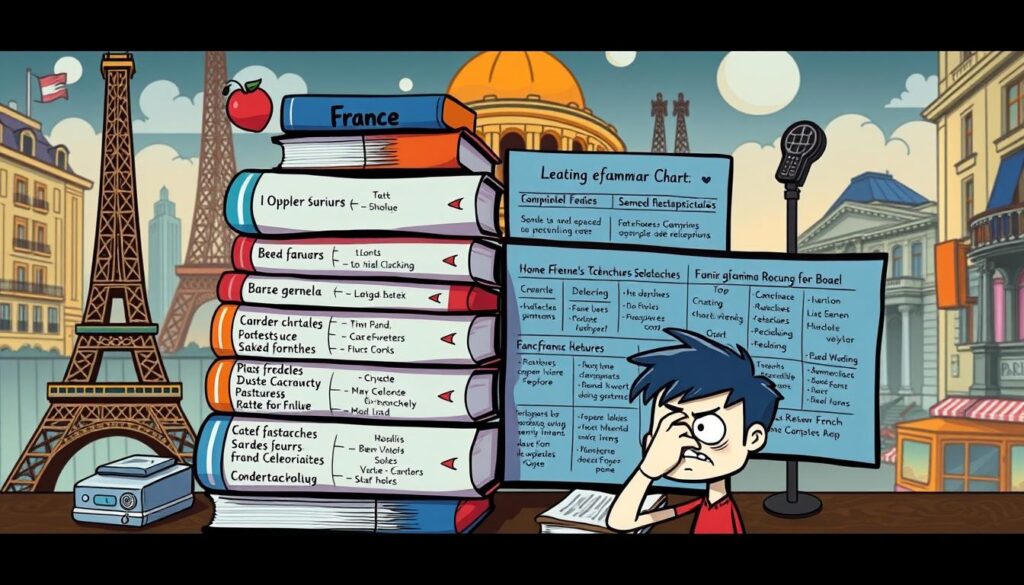Are you a student or parent exploring high school options? You might think about high school language graduation requirements. You may also ponder if a high school foreign language mandate impacts you. Knowing about the importance of studying French in high school is key. Remember, in the U.S., these requirements can change a lot.
Whether you need to study French or another language in high school depends on your state and district. The benefits of being bilingual are many. They range from understanding cultures to boosting career chances. Schools think a lot about these benefits. This shapes not just the classes you pick but also your chances on a global stage.
Learning French can make your high school time more valuable. It’s because the world values language skills a lot. However, there’s no rule saying French must be studied by everyone. Instead, what you learn depends on your school and where you live. This shows how diverse American education is.
Understanding High School Language Requirements in the United States
State policies hugely shape high school language education in the U.S., aiming to prepare students for global society. These policies determine high school language requirements that boost students’ language skills and cultural insights.
The Role of State Education Departments in Language Mandates
State education departments set the high school language graduation requirements. This decides if students will learn languages like French, Spanish, or Mandarin. The choices reflect the state’s educational aims and the needs of its people. For example, states with many Hispanic people might focus on Spanish. This helps in both communication and cultural bonding.
Common Language Options in U.S. High Schools
- Spanish: Due to its practical utility in the U.S., Spanish remains the most studied language in high schools.
- French: Popular for its global relevance and cultural richness.
- Mandarin: Gaining traction due to China’s global economic influence.
- German and Japanese: Often offered due to economic and cultural ties.
Experts say learning languages like French or German can help with understanding others and thinking in new ways. It also boosts cultural awareness.
Case-by-Case Basis: Electives and School District Policies
Some districts require certain high school curriculum language options as core subjects. Others let students pick languages as electives, based on what they like or want for their future careers. Schools may offer special courses for students at different learning levels.
It is important to look at your school district’s rules on language classes. This helps students and parents pick the best language study plan for their goals.
Do You Have to Learn French in High School?
In the U.S., whether you need French in high school depends on the school’s rules and your goals. It’s not a simple ‘yes’ or ‘no’ answer. Each school has its requirements, and your personal academic goals matter too.
High schools offer many languages, including Spanish, Mandarin, and French. If you’re asking, “do you have to learn French in high school?”, remember some schools require foreign language courses. However, they usually let you choose the language.
At many schools, French is an option as a french language elective high school course. This lets students pick French if it interests them or fits their future plans. Electives allow students to customize their education.
- Many pick French because of the cultural and business links with the U.S.
- Advanced French is highly regarded by colleges, with some recommending four years of language study.
- Knowing French is useful for international business or travel, as it’s a key global language.
For quick improvement, consider immersion or intensive courses in the summer. While direct school programs might be rare, online resources can help. They are a good addition to regular school work.
In the end, French isn’t always required, but choosing it can be very rewarding. It can open doors in both academics and careers. French stands out among high school language options, fitting well with many students’ goals.
Comparing French Language Requirement Across Different Countries
Education around the world varies, especially in learning languages. The high school foreign language mandate is key for students’ futures. Different countries have their way of teaching French in schools. This shows how they value education and the benefits of learning French in high school.
Language Curriculum in France: A Centralized Education System
In France, the government ensures everyone learns the same way. French is a must from a young age. This makes sure all kids can speak French well. It’s important for talking every day and keeping their culture alive.
Since French is also used in global groups and diplomacy, French kids are ready for international activities.
Canadian Insight: Bilingualism and French Study in Schools
Canada is special with English and French as its main languages. This makes it easier for students to learn both languages. In places like Quebec, speaking French is often a must. Knowing both languages opens up job chances and helps understand different cultures better. To learn more about bilingual advantages, check out this article.
French as a Foreign Language in International Schools
Many international schools teach French, catering to students from everywhere. French is the second most popular language after English in the global high school foreign language mandate. Its popularity comes from France’s influence and the language’s role in thinking and debate.
| Country | Mandate for French Language | Additional Notes |
|---|---|---|
| France | Mandatory from early education | Centralized curriculum with a strong emphasis on academic excellence |
| Canada | Varies by province; mandatory in French-speaking areas | Integral part of the national identity, supporting bilingual communication |
| International Schools | Commonly offered as a second language | Facilitates global communication and international relations |
Looking at French language education worldwide offers interesting insights. As countries see the benefits of learning French in high school, they keep adapting their teaching methods. This prepares students for a global and culturally rich future.
The Importance of Studying French in High School
Studying French in high school is crucial. It combines learning with worldwide connection and cultural insight. Knowing French closes communication gaps and offers students many chances in different areas.
Cultural Competence and Global Awareness
Today’s world is more connected than ever. Knowing French is key to understanding different cultures and boosting global awareness. By getting to know other cultures, students become better global citizens. They are more empathetic and informed. A study says French might become the most spoken language by 2050.
French Language as a Stepping Stone to Other Romance Languages
Learning French well helps with other Romance languages like Spanish and Italian. These languages have Latin roots, similar to French. This makes learning them easier. Understanding these connections is easier with the right educational tools, available at coherent educational platforms.
American education emphasizes the importance of studying French in high school. It aligns with the foreign language mandate in high school, shaping students ready for a multilingual world.
| Benefits | Description |
|---|---|
| Cognitive Development | Enhances critical thinking and problem-solving skills. |
| Cultural Awareness | Opens up learners to French culture, enhancing global understanding. |
| Academic Advantage | Creates more competitiveness when applying for prestigious universities. |
| Career Opportunities | Equips students with skills to work in diverse language-centered roles. |
Teaching French has changed from using cassettes to digital tools. This shift improves how students learn French. It adapts to new learning methods and meets the needs of different learners, including those with hearing issues.
Studying French in high school is a path to becoming bilingual. This skill is valued globally in jobs and in life.
Benefits of Learning French in High School
Learning French during high school goes beyond just picking up a new language. It helps you make smart choices for your education and meet high school language graduation requirements in a meaningful way.
French is not only a beautiful language but also useful for work around the world. Let’s explore how it can open doors for your career and increase your cultural experiences.
Enhancing Career Opportunities With Bilingual Skills
Knowing French can really improve your chances of getting a job, especially abroad. With French spoken officially in 29 countries and important in many organizations, it makes you more attractive to employers. They see bilingual people as more flexible, culturally knowledgeable, and able to take on complex tasks with diverse groups.
Being able to speak two languages is often a plus, or even a must, in fields like diplomacy, tourism, and international business. Check out why bilingualism matters at this site.
Access to Rich Cultural and Literary Traditions
Learning French lets you dive into a vast collection of famous literature, movies, and art. This gives you a closer connection to rich cultural traditions. Through its classic and modern books, French literature plays a big part in the world’s literary scene, opening your mind and helping you think deeply about global topics.
Moreover, French aligns with high school language graduation requirements, preparing you for further education or careers requiring multiple languages. Let’s look at some facts that show how important French is globally:
| Statistic | Relevance |
|---|---|
| More than 270 million people speak French. | It’s a major language for global communication. |
| French is the official language in 29 countries. | Knowing French opens doors worldwide. |
| French could become more important than English globally. | Shows its rising significance in international affairs and business. |
| French culture encourages exploring international literature. | Reading different works expands your literary and cultural insights. |
Choosing to learn French in high school should align with your long-term academic and career plans. This journey doesn’t just give you a useful skill. It also enriches your life, making you smarter and more connected with people around the world.
Exploring French Language Elective High School Courses
High schools let you add French language electives to your studies. This chance lets you learn about the Francophone world. Courses range from beginner to advanced, fitting different interests and levels.
Variety and Types of French Classes Offered
There are French classes for all learning stages, whether you’re just starting or improving fluency. A special class, French Language and Culture, is open for fourth-year high school students without prerequisites. It’s like a college course and helps students get better at understanding French through different media.
In this class, students improve their listening, learn to analyze media, and talk about culture. This broadens their understanding of French and how to use it in various situations.
Interactive Learning: Exchange Programs and Study Abroad Opportunities
Some schools make learning French more interactive by offering exchange and study abroad programs. These experiences help you use French in real situations and understand the culture better. Going to Francophone countries makes learning French more effective and memorable.
Such programs are not just great for learning French. They also help you grow personally and become more globally aware. These experiences can shape your future in education and career.


